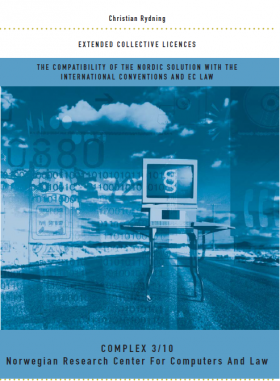The extended collective licence-model is originally a Nordic legal invention aimed to provide a particular solution to the dilemma of imposing limitations or upholding the exclusive copyright in situations where normal contractual rights clearance is impractical. Many patterns of use, such as mass-photocopying in schools, are incompatible with direct clearance of rights, often resulting in either illegal use or the abstention from otherwise desirable use. The extended collective licences seek to resolve problems of this particular kind by enabling representative collective management organisations to conclude collective licence agreements that also bind non-member rights holders.
It is evident, however, that such regulations may confl ict with the sphere of exclusivity afforded the authors and other rights holders by certain international legal instruments. The purpose of this thesis is to assess the compatibility of the extended collective licence-model with relevant international norms. Differences between the various provisions falling under the common umbrella of an extended collective licence-model imply the possibility of different conclusions. Several provisions are thus assessed, and all the extended collective licence-provisions that exist in Norwegian legislation are given a short presentation initially. Pertaining to the chosen legal framework, the assessment is first conducted with respect to the three-step test as incorporated in the Berne Convention, the TRIPS-agreement, the WIPO Copyright Treaty and the WIPO Performances and Phonograms Treaty.
Subsequently, the extended collective licence-model is studied against the background of legislation from the European Community, notably directive 2001/29/EC (Infosoc).
Christian Rydning’s thesis was written while he worked as a research assistant at the Department for Private Law at the University of Oslo in 2008-2009, during the fi fth and fi nal year of his master’s degree in law. Christian Rydning is currently living in Paris, where he is studying political science at Institut d’études politiques de Paris.
Les hele utgivelsen CompLex 2010-03 (pdf)
